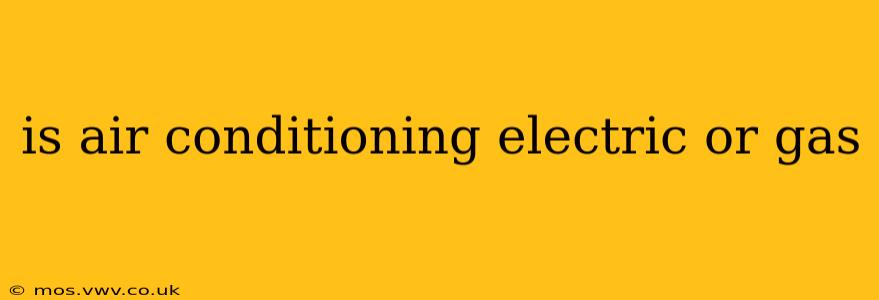Is Air Conditioning Electric or Gas? Understanding Your Cooling Options
The short answer is: air conditioning systems can be electric, gas, or even a hybrid of both. The best option for you depends on several factors, including your budget, climate, energy costs, and environmental concerns. Let's explore the different types of AC systems in more detail.
What are the different types of air conditioning systems?
Most commonly, air conditioners are electric. These systems use electricity to power a compressor, which circulates refrigerant to cool the air. Electric ACs are widely available, relatively inexpensive to install, and are suitable for most homes and businesses. They come in various sizes and configurations, including window units, split systems, and central air conditioning.
However, gas-powered air conditioning systems also exist. These systems use natural gas or propane to power the compressor. While less common than electric ACs, they can be a cost-effective choice in areas with high electricity prices and readily available natural gas. They might offer advantages in terms of energy independence, but they typically require a more complex installation.
Beyond the primary fuel source, there are also hybrid systems that combine electric and gas components. These often incorporate heat pumps, which can use electricity for cooling and gas for heating, offering a balanced approach to both climate control aspects.
What are the pros and cons of electric vs. gas air conditioning?
Electric Air Conditioning:
Pros:
- Widely available and relatively inexpensive: Electric AC units are readily available in various sizes and configurations, making them easily accessible for most consumers. Installation costs are generally lower compared to gas systems.
- Lower installation complexity: Installation is generally less complex and less expensive than gas systems, requiring standard electrical connections.
- Quiet operation: Electric AC units are typically quieter in operation compared to gas-powered units.
Cons:
- Higher electricity costs in some areas: Electricity costs can be high depending on your location, making operation expensive. This cost increases significantly when the unit is older and inefficient.
- Dependence on the power grid: Power outages will render the system completely ineffective, leaving you without cooling.
Gas Air Conditioning:
Pros:
- Potentially lower operating costs in some areas: In areas with high electricity costs and low natural gas prices, gas AC can be more economical.
- Energy independence: Less reliance on the power grid, minimizing the impact of power outages.
- Can provide both heating and cooling: Some gas AC units also function as heating systems, streamlining energy needs.
Cons:
- Higher initial installation costs: Installation can be more complex and expensive due to the necessity of gas lines and specialized equipment.
- Higher maintenance costs: Maintenance may be more complex and expensive compared to electric units.
- Potentially louder operation: Gas units tend to be noisier than electric systems.
- Environmental concerns: Burning gas produces greenhouse gas emissions.
Which type of air conditioning is better for the environment?
The environmental impact depends on several factors, including the efficiency of the unit and the source of the electricity and gas. Generally, high-efficiency electric heat pumps are considered to be the most environmentally friendly option. These systems use less energy and reduce reliance on fossil fuels. However, the efficiency of both electric and gas systems should be considered when making a decision. Look for high SEER (Seasonal Energy Efficiency Ratio) ratings for electric systems and high AFUE (Annual Fuel Utilization Efficiency) ratings for gas systems.
What factors should I consider when choosing between electric and gas air conditioning?
The best choice depends on your specific circumstances. Consider:
- Your budget: Initial installation costs and ongoing operating costs.
- Your local energy prices: Electricity vs. natural gas costs in your area.
- Climate: The average temperature and humidity in your region.
- Your home's energy infrastructure: Availability of gas lines and electrical capacity.
- Environmental considerations: Your preference for reducing your carbon footprint.
By carefully weighing these factors, you can make an informed decision about the best type of air conditioning system for your needs. Consulting with a qualified HVAC technician is always recommended to ensure you choose the most efficient and appropriate system for your home or business.
